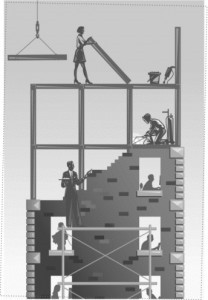 Over the next few posts we’ll cover each of the 6 principles of Appreciative Inquiry, in layman’s terms.
Over the next few posts we’ll cover each of the 6 principles of Appreciative Inquiry, in layman’s terms.
The Constructionist Principle suggests we make meaning out of our lives and our experiences in conversation with others. The language we use to describe things actually shapes how we see them.
For example people can go through exactly the same challenging or negative experience – but use very different language and tell very different stories about that experience. Some people focus on being a victim – and this becomes their reality. Others focus on their stories of survival and how they overcame the challenge, creating a very different reality for themselves.
In an organisation the same thing can happen. If the stories being told around the lunch table or over the coffee breaks are all about how terrible the boss is and how overworked people are, then those stories will shape their reality. And that’s going to be the kind of place they will build – an unhappy place that will probably never reach its full potential.
But if the stories people tell are about how good it is to work there, and the language they use about each other and their boss is mostly positive – then they are going to see a different reality. And this will in turn affect the kind of workplace it becomes – a happier and more productive environment.
What sort of stories do you tell in your workplace?
Footnote: Next Appreciative Inquiry post – Poetic Principle
 Our monthly newsletter
Our monthly newsletter
Speak Your Mind